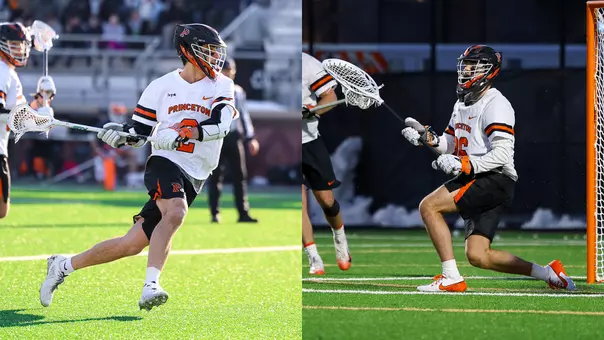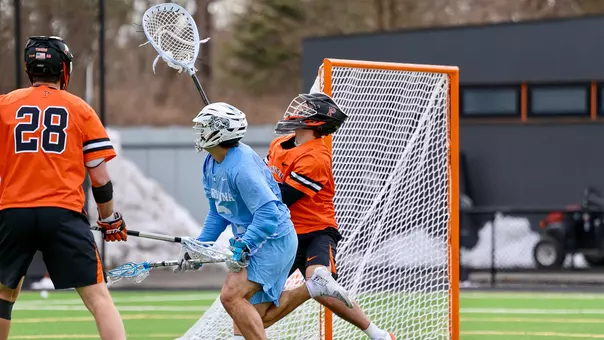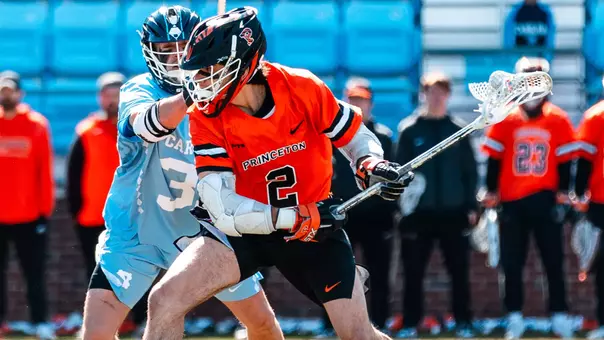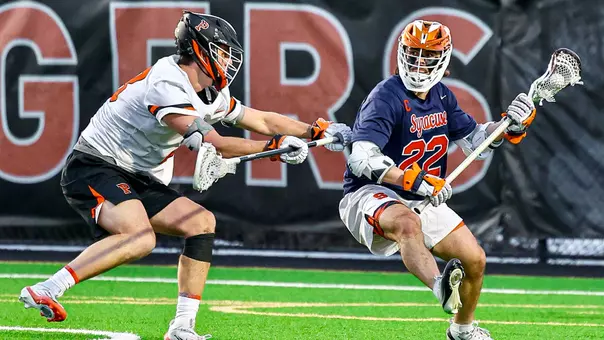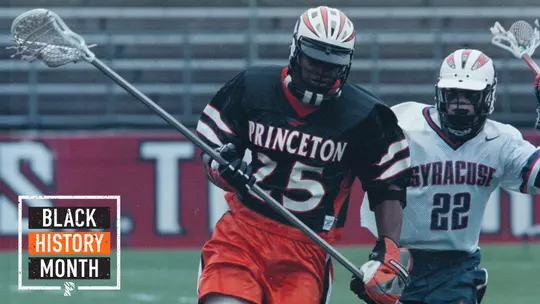
Damien Davis '03 - Inspiring the Next Generation
2/8/2021
The defense had done its job. The ball was now at the other end of the field. All Damien Davis could do was watch.
It was Memorial Day 2001. Princeton and Syracuse in the NCAA final. Overtime.
The ball was in Ryan Boyle’s stick. Davis had seen this a million times before. After all, he’d literally grown up playing with – and at times against Boyle -- especially on the practice field at the Gilman School in Baltimore and now at Princeton.
And here was Davis’ shot at an NCAA championship, in the stick of his longtime friend.
“I could see the whole thing unfold,” Davis says. “Ryan had the ball, and like always the defense was super focused on him.”
As soon as the Orange defense turned to face Boyle, Princeton attackman B.J. Prager made a simple cut.
“When I saw that, “I knew we were getting a good shot,” Davis says.
Boyle delivered the ball. Layup. Championship.
I was on the bottom of the dogpile. You tackle someone first, and everyone jumps on top of you. I remember that. I remember the feeling of exhaustion and euphoria. I remember the picture of everyone in front of the scoreboard. Those are great memories.Damien Davis
They’ve also been fueling memories for Damien Davis, one the greatest defensemen Princeton men’s lacrosse history. Davis was part of Princeton’s Gilman pipeline, one that laid the foundation for three straight NCAA championship game matchups against Syracuse from 2000-02 and the 2001 title.
He would start every game of his career on defense for the Tigers. His one-on-one matchups against Syracuse legend Mikey Powell are legendary, including the game at the Carrier Dome in 2003 when Davis held Powell with no goals and no assists while scoring a goal of his own in an 11-10 Princeton win.
For his part, Davis was a first-team All-American in 2003 as a senior after being a second-team All-American as a sophomore and junior. He was twice named first-team All-Ivy League.
He is the only Black Princeton men’s lacrosse player ever to be a first-team All-American, and he and Austin Sims are the only two Black Princeton men’s lacrosse players ever to be named first-team All-Ivy League.
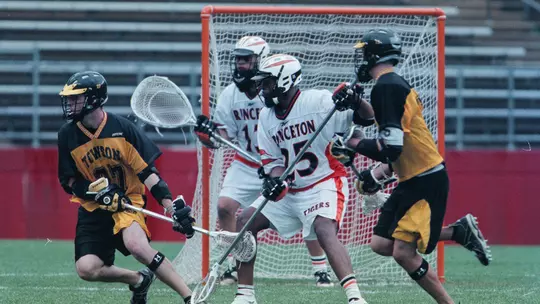
Davis’ background was at a predominantly white prep school (Gilman) in a predominantly white sport (lacrosse), and he was used to not seeing too many, if any, other black players. He also heard his share of slurs.
“I heard the comments,” he says. “But hey, I was a defenseman. I had a chance to go after some people and take it out on them. When it happened, I do have to say it was motivating. But most people, the overwhelming majority of them, weren’t like that. My father used to tell me not to worry about being the first Black anything. He told me to worry about being my best.”
These days, when Davis tries to help the next generations of lacrosse players try to reach the heights he did, he does so without ever mentioning his own credentials.
“If I came in and starting saying ‘oh, I was an All-American,’ then nobody would listen to me,” he says. “I keep all that to myself. I try to show them that I know what I’m talking about. If they believe in me, they’ll start to get it themselves.”
Davis has spent a great deal of time working with young lacrosse players, mostly on the middle school level, ever since he graduated from Princeton. He has been working to bring the game into the inner city of Baltimore, and his goal is to take kids from what often are tough, disadvantaged backgrounds and open doors to them in athletics and education.
It is, after all, how to break the cycle of poverty. Education. And if athletics are the catalyst for that, so much the better.
“Most big cities have their tough areas,” he says. “Baltimore has a pretty big tough spot. The kids come out of rough situations.”
Davis has worked with kids who attend charter schools. With his help, many of these kids have gone on to attend some of the top prep schools in the area and eventually on to college.
Davis himself is a Gilman product through and through. The son of a neurosurgeon, he first attended Gilman in the first grade, and that was the same time he was introduced to the sport of lacrosse.
By the time he got to the high school level, he was also an accomplished football player (Boyle was the team’s quarterback) and wrestler as well. Because he was playing three sports, his stick skills might not have been what they would have been had he played lacrosse year-round.
“I didn’t have a great stick, but I was fast and I could stay in front of people,” he says. “They gave me a long pole.”
While at Gilman, he played with Boyle and against future Princeton teammates like Joe Rosenbaum, Owen Daly, Brad Dumont, Josh White and Ricky Schultz. He was part of the No. 1 recruiting class in the country when he arrived at Princeton.
“Coach [Bill] Tierney did a wonderful job of explaining to us that we were good and we had no excuses,” Davis says. “Maybe our senior year didn’t end up the way we wanted [a quarterfinal loss to Syracuse], but it was nice to see how we did for four years. Three finals. We felt pretty good about how things ended up.”
Davis is one of the best takeaway defenseman Princeton has seen. He had great speed and tenacity, with a motor that never stopped. He was a total team player. In short, he was not the guy you wanted guarding you.
He’s a great person. There’s not a person in our program who has ever said a bad word about him. He’s the kind of person you are proud to know is an alum of your program. And on the field? He was great. He was a killer. There haven’t been too many better than he was.Princeton Men's Lacrosse Head Coach Matt Madalon
Davis played in Major League Lacrosse, and he also immediately started to work with kids through the charter schools. He knows full well how important what he’s teaching is.
“My belief is that these kids are going to show up from the predominantly Black inner city and try to be successful at a tough prep school,” he says. “Having friends and sports can level-set for them. It helps them with the transition. To be frank, it helps set you apart. If you’re a good kid and you have good grades, being good at sports helps set you up for college. It did for me. Gilman did a great job of preparing me. Plus, it’s just a safe environment. It gets them outside. It gets them with their friends, and it’s in an environment that focuses on academics and athletics.”
His full-time job is with Brown Capital, an investment company. He is an extremely loyal lacrosse alum, and his bright orange outfits are a staple at the Friends of Princeton golf outings.
His legacy at Princeton is as one of the program’s all-time greats, an overwhelming success on the team and individual levels. His work with the kids at the charter schools only adds to the full picture of who he is as a human being.
“At the very least, a kid will leave the charter school and a prep school will take a chance on him because he’s got that extra thing,” he says. “They’ve been coached. They understand teamwork. They’re moving in the right direction. We’ve had some great stories about how these kids get through school. Maybe for some it’s with art of music. For me, it was sports. I’ve seen firsthand how much that can help, and it’s something I love to try to give back.”


